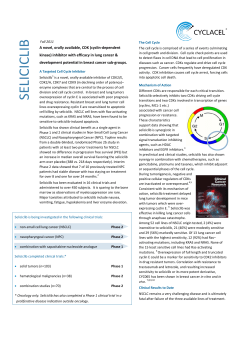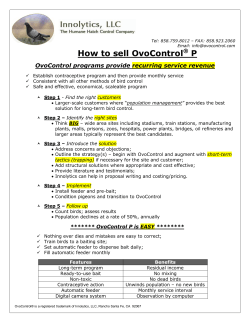
Indication Title Protocol ID BO28984 (ALEX) Phase Sponsor
Indication Première ligne pour les cancers du poumon non à petites cellules avec mutation ALK positive Title RANDOMIZED, MULTICENTER, PHASE III, OPEN-LABEL STUDY OF ALECTINIB VERSUS CRIZOTINIB IN TREATMENT-NAÏVE ANAPLASTIC LYMPHOMA KINASE−POSITIVE ADVANCED NON−SMALL CELL LUNG CANCER Protocol ID BO28984 (ALEX) Phase Phase III Sponsor Roche Principal Investigator Dr. S. Peters Primary Objective To evaluate and compare the efficacy of alectinib compared to crizotinib in patients with treatment-naïve anaplastic lymphoma kinase (ALK)-positive advanced nonsmall cell lung cancer (NSCLC), as measured by investigator-assessed progression-free survival Inclusion/exclusion criteria Inclusion Criteria Patients must meet the following criteria for study entry: • Histologically or cytologically confirmed diagnosis of advanced or recurrent (Stage IIIB not amenable for multimodality treatment) or metastatic (Stage IV) NSCLC that is ALK-positive as assessed by the Ventana IHC test. Sufficient tumor tissue to perform ALK IHC and ALK FISH is required. Both tests will be performed at designated central laboratories. • Age ≥ 18 years old. • Life expectancy of at least 12 weeks. • ECOG PS of 0−2. • Patients had no prior systemic treatment for advanced or recurrent (Stage IIIB not amenable for multimodality treatment) or metastatic (Stage IV) NSCLC. • Adequate hematologic function: Platelet count ≥ 100 × 109/L ANC ≥ 1500 cells/μL Hemoglobin ≥ 9.0 g/dL • Adequate renal function: Calculated creatinine clearance at least 45 mL/min • Patients must have recovered from effects of any major surgery or significant traumatic injury at least 28 days before the first dose of study treatment. • Measurable disease (by RECIST v1.1) prior to the administration of study treatment. • Prior brain or leptomeningeal metastases allowed if asymptomatic and diagnosed incidentally at study baseline. If patients have neurological symptoms or signs due to CNS metastasis, patients need to complete whole brain radiation or gamma knife irradiation treatment at least 14 days before enrollment and be clinically stable. • For all females of childbearing potential, a negative pregnancy test must be obtained within 3 days before starting study treatment. • For women who are not postmenopausal (≥ 12 months of non-therapyinduced amenorrhea) or surgically sterile (absence of ovaries and/or uterus): agreement to remain abstinent or use single or combined contraceptive methods that result in a failure rate of < 1% per year during the treatment period and for at least 3 months after the last dose of study drug. Abstinence is only acceptable if it is in line with the preferred and usual lifestyle of the patient. Periodic abstinence (e.g., calendar, ovulation, symptothermal, or postovulation methods) and withdrawal are not acceptable methods of contraception. Examples of non-hormonal contraceptive methods with a failure rate of < 1% per year include tubal ligation, male sterilization, hormonal implants, established, proper use of combined oral or injected hormonal contraceptives, and certain intrauterine devices. Alternatively, two methods (e.g., two barrier methods such as a condom and a cervical cap) may be combined to achieve a failure rate of < 1% per year. Barrier methods must always be supplemented with the use of a spermicide. • For men: agreement to remain abstinent or use a condom plus an additional contraceptive method that together result in a failure rate of < 1% per year during the treatment period and for at least 3 months after the last dose of study drug. Abstinence is only acceptable if it is in line with the preferred and usual lifestyle of the patient. Periodic abstinence (e.g., calendar, ovulation, symptothermal, or postovulation methods) and withdrawal are not acceptable methods of contraception. • Able and willing to provide written informed consent prior to performing any study-related procedures and to comply with the study protocol, including patients must be willing and able to use the electronic patientreported outcome (ePRO) device. Exclusion criteria Patients who meet any of the following criteria will be excluded from study entry: • Patients with a previous malignancy within the past 3 years are excluded (other than curatively treated basal cell carcinoma of the skin, early gastrointestinal (GI) cancer by endoscopic resection, in situ carcinoma of the cervix, or any cured cancer that is considered to have no impact in PFS and OS for the current NSCLC). • Any GI disorder that may affect absorption of oral medications, such as mal-absorption syndrome or status post-major bowel resection. • Liver disease characterized by: ALT or AST > 3 × ULN (≥ 5 × ULN for patients with concurrent liver metastasis) confirmed on two consecutive measurements OR Impaired excretory function (e.g., hyperbilirubinemia) or synthetic function or other conditions of decompensated liver disease such as coagulopathy, hepatic encephalopathy, hypoalbuminemia, ascites, and bleeding from esophageal varices OR Acute viral or active autoimmune, alcoholic, or other types of hepatitis • National Cancer Institute Common Terminology Criteria for Adverse Events (NCI CTCAE) (version 4.0) Grade 3 or higher toxicities due to any prior therapy (e.g. radiotherapy) (excluding alopecia), which have not shown improvement and are strictly considered to interfere with current study medication. • History of organ transplant. • Co-administration of anti-cancer therapies other than those administered in this study. • Patients with baseline QTc > 470 ms or patients with symptomatic bradycardia < 45 beats per minute. • Administration of strong/potent cytochrome P450 (CYP)3A inhibitors or inducers within 14 days prior to the first dose of study treatment and while on treatment with alectinib or crizotinib except for oral corticosteroids up to 20 mg of prednisolone equivalent per day. • Administration of agents with potential QT interval prolonging effects within 14 days prior to the first administration of study drug and while on treatment. • History of hypersensitivity to any of the additives in the alectinib drug formulation (lactose monohydrate, microcrystalline cellulose, sodium starch glycolate, hydroxypropyl cellulose, sodium lauryl sulfate [SLS], magnesium stearate). • History of hypersensitivity to any of the additives in the crizotinib drug formulation (silica, colloidal anhydrous cellulose, microcrystalline calcium hydrogen phosphate, anhydrous sodium starch glycolate, magnesium stearate). • Pregnant or lactating women. • Known HIV positivity or AIDS-related illness. • Any clinically significant concomitant disease or condition that could interfere with, or for which the treatment might interfere with, the conduct of the study or the absorption of oral medications or that would, in the opinion of the Principal Investigator, pose an unacceptable risk to the patient in this study. • Any psychological, familial, sociological, or geographical condition potentially hampering compliance with the study protocol requirements and/or follow-up procedures; those conditions should be discussed with the patient before trial entry.
© Copyright 2025


















